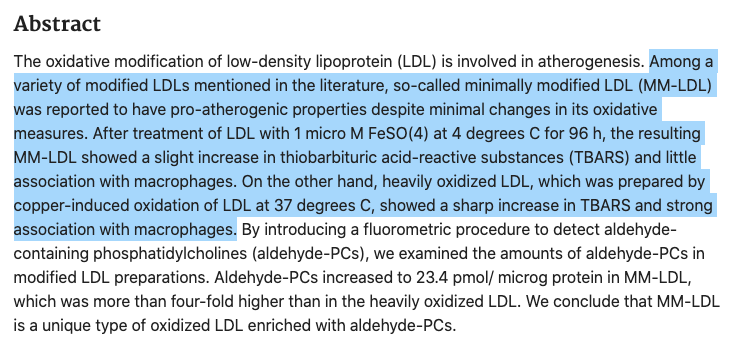1/ Interesting article from AHA via @TuckerGoodrich.
This is of particular interest to me -- especially with regard to "modified LDL". The most often discussed modification (and perhaps the most likely) is oxidation of the LDL (OxLDL) https://twitter.com/TuckerGoodrich/status/1328359465255464967
This is of particular interest to me -- especially with regard to "modified LDL". The most often discussed modification (and perhaps the most likely) is oxidation of the LDL (OxLDL) https://twitter.com/TuckerGoodrich/status/1328359465255464967
2/ But I've long complained that the pass/fail nature of the OxLDL assay (offered through many labs) doesn't get to the metric I really want -- which is a direct quantification of the oxidized phospholipids themselves. But now that assay is available! (via @BostonHeartDX)
3/ Is there such a thing as "minimally modified LDL" vs "heavily oxidized LDL"? Yes.
The degree of modification matters in the immune response.
https://pubmed.ncbi.nlm.nih.gov/14561732/
The degree of modification matters in the immune response.
https://pubmed.ncbi.nlm.nih.gov/14561732/
4/ To be sure, it is speculated some amount LDL will get oxidized in the process of synthesis, and now my own OxPL data appears to substantiate that.
However, can the total quantity of OxPL itself be at very low levels in spite of very high LDL-P? My data likewise suggests so...
However, can the total quantity of OxPL itself be at very low levels in spite of very high LDL-P? My data likewise suggests so...
5/ I'll have a post soon on this specifically (my Part II from this experiment https://cholesterolcode.com/the-oxldl-replication-experiment-findings-part-i/ )
But I'd like to leave you with an exit question...
But I'd like to leave you with an exit question...
6/ (Not rhetorical)- Given the same amount of oxidative stress, it better to (1) have a small number of LDL get maximally oxidized or (2) have a large number of LDL get minimally oxidized due to greater diffusion?
I don't know the answer to that question, but definitely curious.
I don't know the answer to that question, but definitely curious.

 Read on Twitter
Read on Twitter


